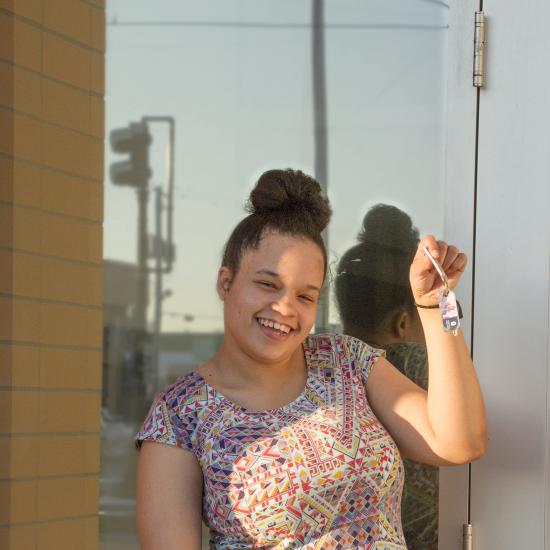It's My Home: Youth Make Opportunities to Thrive at Prior Crossing
Michaela Jones will never forget the first time she unlocked the door to her studio apartment at Prior Crossing. At age 21, she was rebuilding her life after experiencing homelessness. She was so excited that she asked a staff member at the apartment building to record the occasion on her phone.
That first turn of the lock provided Michaela with more than a space of her own. At Prior Crossing, a supportive housing development in Saint Paul for youth who have experienced homelessness, Michaela has access to Wilder case managers and an employment specialist as she pursues career and life goals. With support and encouragement – and her own resilience and determination – Michaela is pursuing her goals and finding success.
“If I were to have an apartment on my own, this would be 50 times harder,” Michaela says. “They’re right downstairs. I am so grateful and blessed.”
Resourceful, Motivated and Resilient Youth
Prior Crossing is a partnership between Beacon Interfaith Housing Collaborative, House of Hope Presbyterian Church, CommonBond Communities and the Wilder Foundation. Wilder offers onsite support services to residents, helping youth establish and achieve education, employment and other life goals.
“There are many negative stereotypes out there about homeless youth. The research, and our experiences with youth at places like Prior Crossing prove those stereotypes are wrong”, says Janayah Bagurusi, director of Family Supportive Housing Services at Wilder. “Young people on their own are some of the most resourceful, motivated and resilient people among us.”
Wilder Research’s 2015 Minnesota Homeless Study found that 68 percent of homeless youth age 19-24 had completed high school or a GED. Forty-two percent of homeless youth were employed at the time of the survey.
Employment specialist Stacy Zimmer estimates that 60 percent of Prior Crossing residents are working or completing paid internships. Others have graduated high school or are close to graduation, and some are in college or considering post-secondary education. “All of our residents have encountered major obstacles in life,” Zimmer says. “They are demonstrating profound resilience every day with the challenges they have to face and manage on a daily basis.”
Building a Life, Career and Home
Michaela was a promising student who earned As and Bs in advanced placement courses and took classes at Saint Paul College and the University of Minnesota while in high school. Michaela then entered a relationship that led her to experience homelessness and abuse.
By summer 2015, Michaela had ended the relationship and moved in with her father. A case manager at Safe Zone, a drop-in center in Saint Paul for youth experiencing homelessness, told her about Prior Crossing. Michaela hesitated, but finally sent in her application after learning that she did not have to be employed to qualify. Within two weeks of applying, Michaela received job offers at two convenience stores. She was part of the first group of residents to move in to Prior Crossing on Sept. 28, 2016. “It’s my home,” Michaela says. “I feel so comfortable and safe here.”
Over the last 18 months, Michaela has created a life for herself at Prior Crossing. She has made friends, taken a cooking class on slow cookers, attended a presentation about domestic abuse, and developed relationships with Prior Crossing staff. Eight months ago, Michaela spotted an ad on Craigslist for a job as a pharmacy technician.
She was hired and now works full time handling prior authorizations for an insurance company. “I love my job and my colleagues,” she says. Now, Michaela is exploring longer term goals and would like to become an activist for youth. She and a mentor from work will travel to Kansas later this month for a youth summit, and she is developing other plans to lift up youth.
“My goals are big,” Michaela says.
